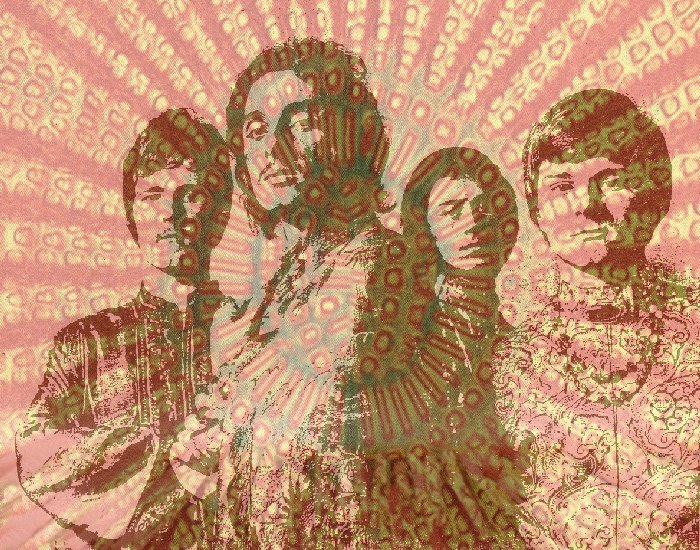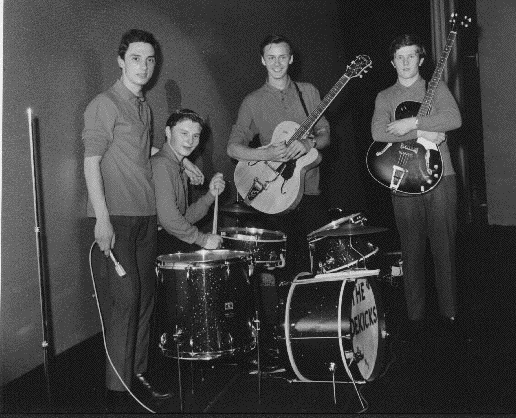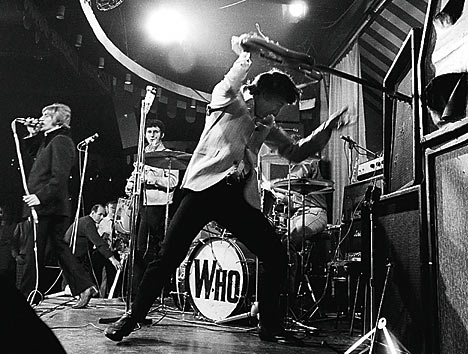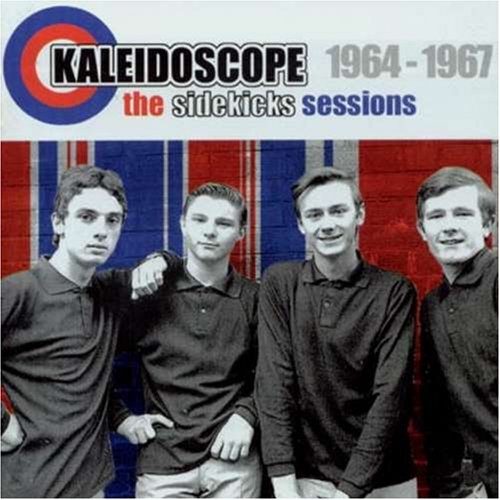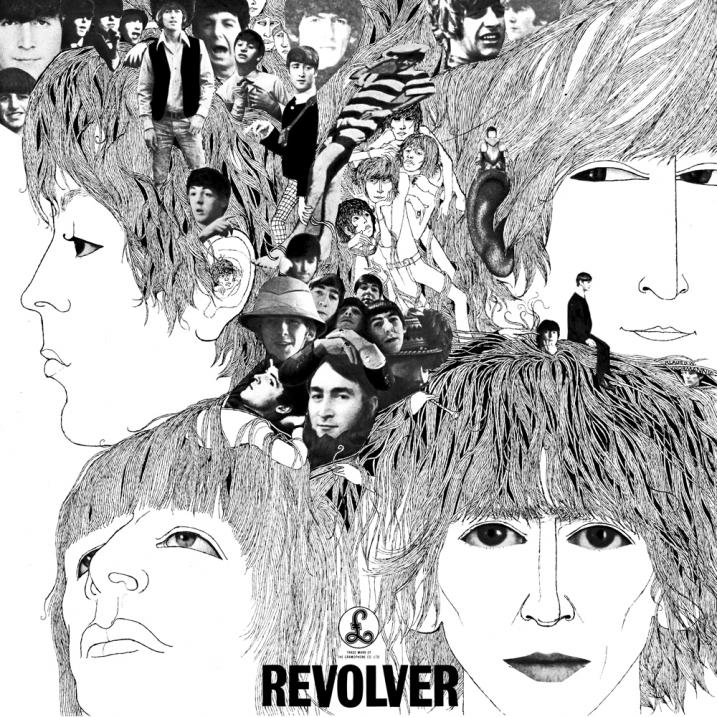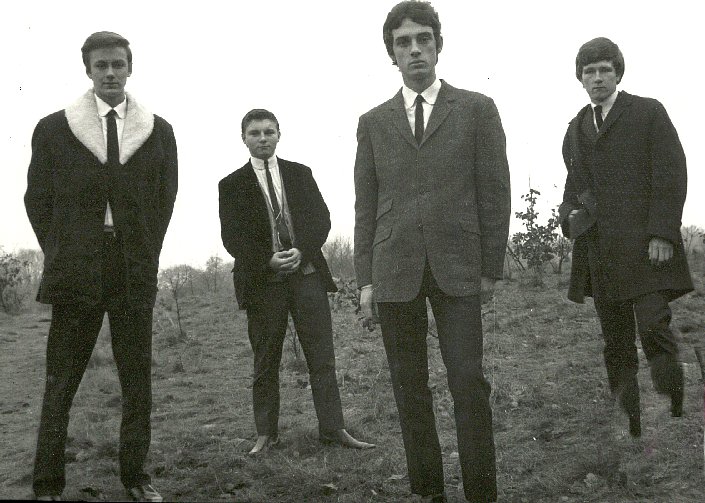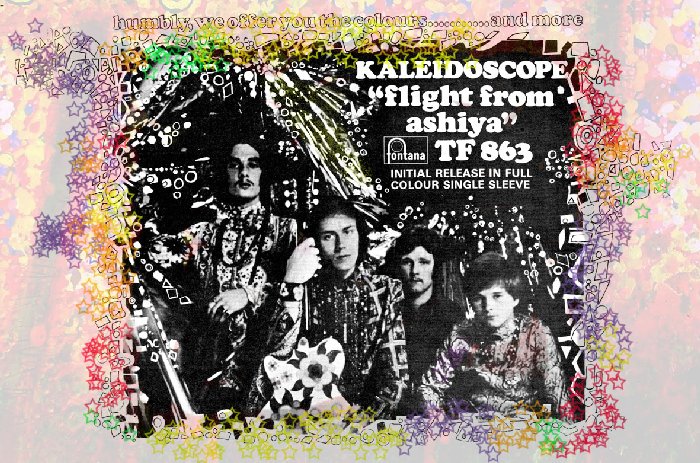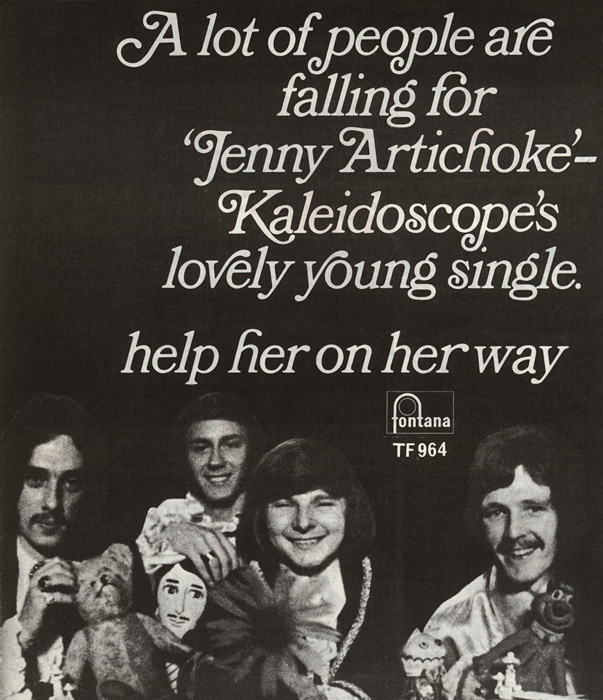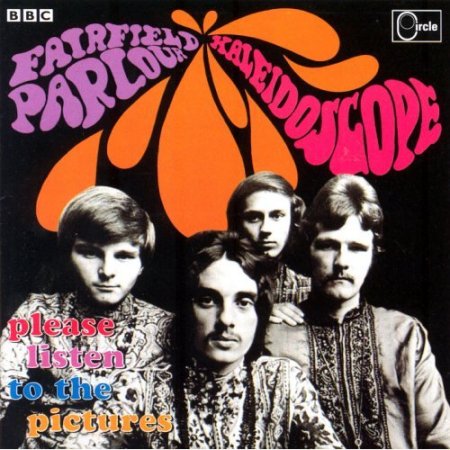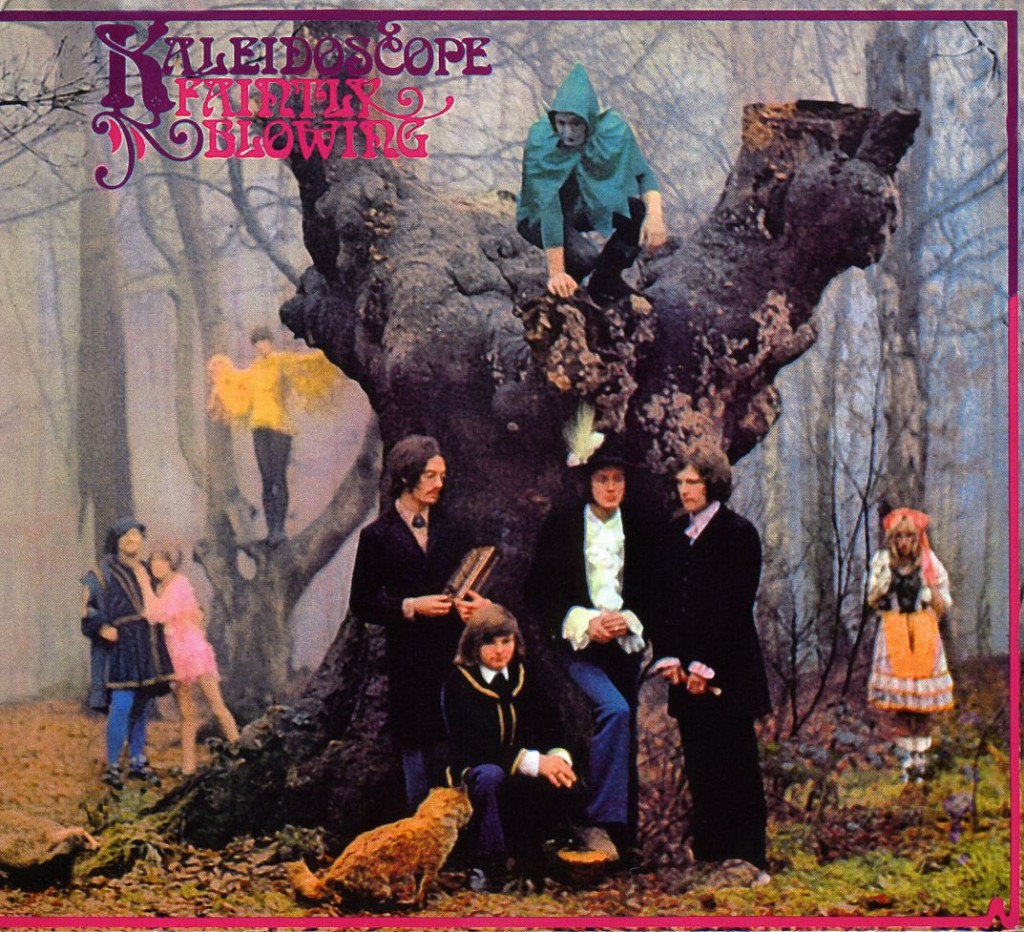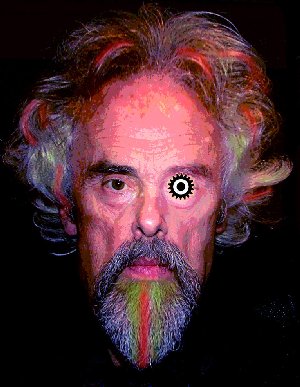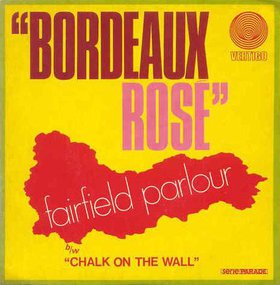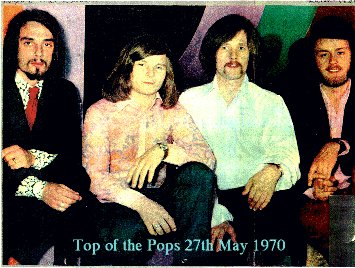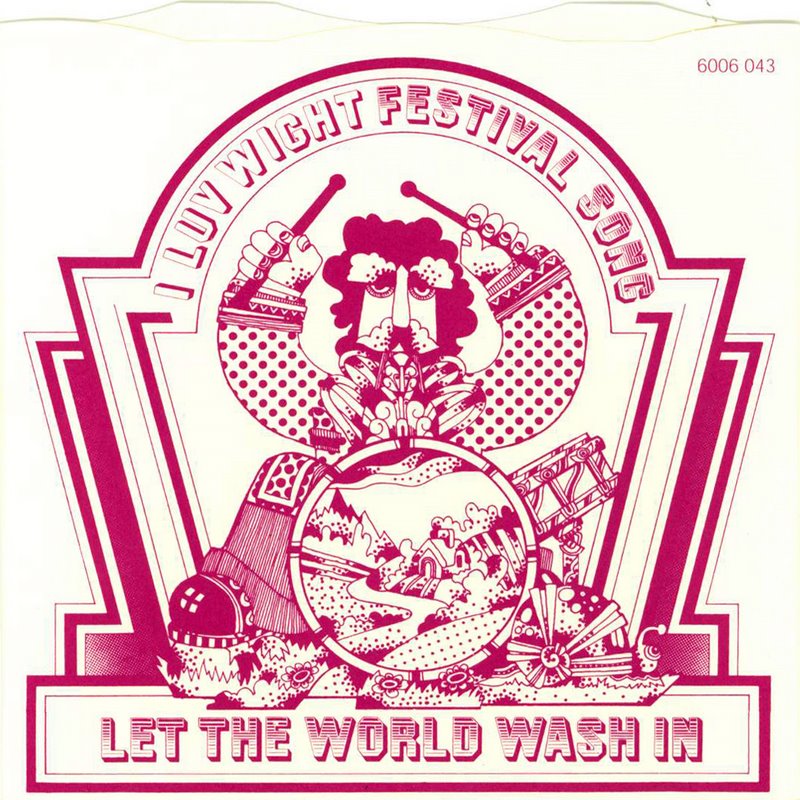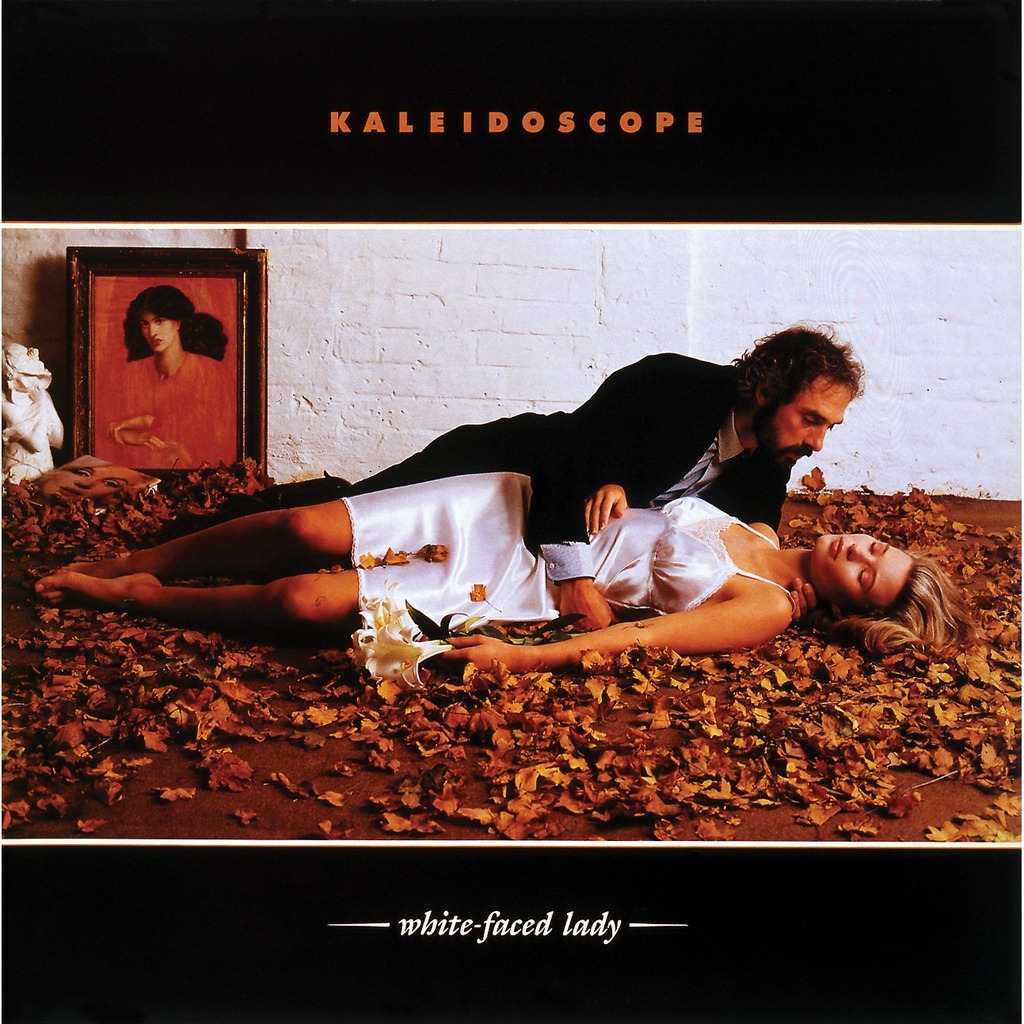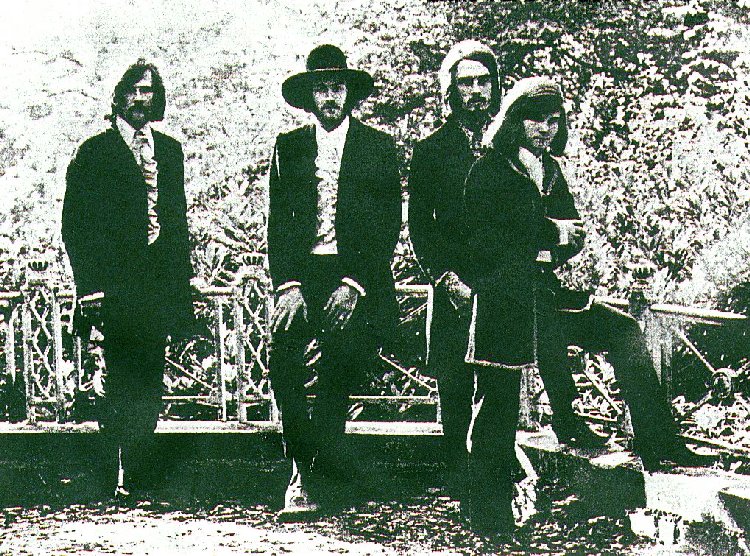Kaleidoscope have been called the world’s favourite lost band. No psychedelic list is ever complete without them because of their two stunning albums in the late sixties “Tangerine Dream” and “Faintly Blowing” plus the peerless single “Flight from Ashiya”. They metamorphosed into Fairfield Parlour in the seventies repeating this feat for two more great albums “From Home To Home” and “White Faced Lady”.
Jason Barnard speaks to their lead singer Peter Daltrey to uncover the story of this truly legendary psychedelic group and his prolific solo career.
Kaleidoscope (used with kind permission)Peter, it’s great to hear from you. Kaleidoscope and Fairfield Parlour are in the pantheon of UK psych greats.
Yeah, but we only realised this not long ago. Unfortunately, you guys weren’t around when we were. That’s the problem. We had a following at the time and we did have sales. We had tons of airplay and great reviews but it didn’t actually go anywhere. It didn’t result in any major success but it is of course very satisfying that decades down the line people like yourself, of a younger generation, appreciate the music, because that’s what we did it for. For people to enjoy it and the fact that people say to me, like you just did, that you appreciate the band and the music is very rewarding.
Kaleidoscope have had various incarnations over the years, the first being The Sidekicks. Wasn’t it that you formed the group while you were working with Eddie Pumer at ABC?
I was working at ABC television in probably ’63 and The Beatles were really beginning to take hold. We all worshipped them. I worked in the post room with a load of guys we all had a real laugh. It was just behind Oxford Circus and we used to have to take all the film cans down into Soho to the various processors down there. We had a quite a ball. We were only young chaps. And then, the story goes, one of the guys I worked with, Eddie Pumer, said one day “Would you like to be in my band?” I was rather taken aback because I had no idea he was in a band for a start and wasn’t quite sure why he was asking me although we were getting on together. But he said “Come and be in the band” and I said “I can’t play anything, I don’t know an instrument.” He said “That’s alright. You can be the singer.” (laughs) So I just fell into that.
The Sidekicks first gig, June 1964, left to right, Peter Daltrey, Danny Bridgman, Eddy Pumer, Steve Clark (used with kind permission)The guys used to rehearse at a school hall in Acton and he said “Why don’t you come along?”. So I jumped on my Lambretta and zoomed over there after work one night, very nervous about it, not having done anything like that before. Obviously like a lot of teenagers, you would fantasise about being a pop singer but not too seriously. I got to the hall and had their equipment set up in one of the school classrooms. I said “What shall we do?” and they said “We play a lot of rhythm and blues standards. Anything you know?” I said, not particularly. They said “What about Johnny B Goode” I said “Yeah. I’ve heard of that.” Somebody had the lyrics written out. We launched into it and off we went. It was immediately great fun and the guys were nice. You know they weren’t loud or brash sort of people. We hit it off in a funny sort of way immediately. We became The Sidekicks. We used to play youth clubs and back rooms of pubs just doing covers of early Stones and other R’n’B standards.
You supported The Who?
Yeah. The Welsh Harp at Hendon. That was quite an experience because they were just up and coming. They had just had, or were just about to have “I Can’t Explain”. They were a lot more loutish than we were. We were quieter chaps but The Who came from a slightly rougher background. I distinctly remember going into the dressing room behind the stage. There were all these guitar cases laid open and each one contained the carcass of a bashed in Rickenbacker, its neck broken and all the bits hanging off. Townshend had just started this thing on stage where he stabbed his speaker stack with his guitars and smash ‘em up. Where they got the money from for replacements I have no idea. We all looked open mouthed at these fantastic guitars smashed to pieces in these boxes and he was very proud of them. He stood back and opened each case to reveal the thing in bits and pieces.
The Who creating havoc at another gigThey went on and did an absolutely amazing show. It’s burnt on my mind. I’d never seen them before and haven’t seen them since but to catch them at that time when they were up and coming and doing this wild act – we’d never seen anything like that before. It was amazing. We hadn’t long got out of Cliff Richard and The Shadows were they did silly dance steps on stage and here were four guys creating absolute havoc and chaos. Moon kicked his drums over. It was a very violent act and very unique, very original, quite awe inspiring.
You recorded loads of demos in that period. What seems mark you out between a lot of other bands of this time is that you tentatively started to write your own material.
From the start we were very ambitious. We were around at a time when The Beatles were proving any four guys could get together if they had determination and an ounce of talent they could do something. Obviously they had more than an ounce but we suspected that we might have an ounce or two. Not big headed about it, not in a vain way but certainly ambitious in craving some sort of success in what we did. But we were doing covers and R’n’B. There was nowhere to go with that. We used to go to all these cheap recording studios and bash out these demos on cheap equipment and that what came out on the Kaleidoscope “The Sidekicks Sessions”.
Kaleidoscope, The Sidekicks Sessions, 1964-1967 CD, Alchemy, 2003It was pretty embarrassing most of that stuff. I only agree to have it put out because I knew that there would be people like yourself who would be interested and that’s fair enough. I don’t mind that. I don’t listen to it myself. The best one on there which still gives me a bit of a buzz is “I’m Looking for a Woman” which is a really good little track. That beats along quite well.
Some of the others demonstrate how poor we were at the time and how dire the studio reproduction was. We quickly realised at this time we weren’t going to go anywhere playing old Mose Allison and Rolling Stones numbers. Eddie and I for some reason, I suppose it was The Beatles, started to write songs. I was the singer, Ed was the guitarist so he wrote the music, I wrote the words. “Drivin’ Around” was the first song we wrote. That’s on the CD.
Your material started to change. “Holiday Maker” is on there isn’t it?
That’s right. That’s interesting because we did a demo of that in one of these cheap studios and the guy that owned the studio pricked up his ears because it’s a good catchy little song. He said “I wouldn’t mind publishing that. I wouldn’t mind putting that out.” Like a lot of devious guys in the music business then and now, you’ve got to be careful with some of them. All they are trying to do is grab copyrights. I think we steered clear of that guy but it was clear from that start on that particular song that it was pretty catchy.
The Beatles and “Revolver” were influential.
Certainly “Revolver”. I love Sgt Pepper, of course it’s a wonderful album. It’s unique, it can never be repeated. But it does rather shadow “Revolver”. If you go through their back catalogue, even their first albums were tremendous. Certainly the song writing from the start was remarkable. You had this clear distinction between McCartney and Lennon and we tended to lean one way or the other. I was always a Lennon fan to be honest. His voice was outstanding on those early tracks. “Eight Days A Week”, the melody and production, the ringing guitars, the Lennon vocals were absolutely spot on.
The Beatles, Revolver LP, Parlophone, 1966You signed to Philips/Fontana through publishing links.
It was “Holiday Maker” again. When the band were sending these demos of to record companies they were either disappearing in a pile, lost, or just being returned. We weren’t getting anywhere then somebody I was working with said “Why don’t you try contacting a publisher rather than a record company?”. I hadn’t thought of that. We looked in the book and there was a company called Flamingo Music and it just happened to be round the corner from the Philips office. We didn’t know that at the time. We rang this guy and said “Can we come in and play you some songs?” he said “No, send some demos in.” The demos again, were returned. He said well alright then, “Why don’t you come in, at lunchtime and play me a couple of songs while I’m having a sandwich and we’ll have a look.” So Ed and I went up here and played him a few songs and he said “Yeah, not bad but come back in six months when you’ve learnt your trade a bit more and learn how to write songs.” So we left the office really dejected and we thought it was another brush off.
The Sidekicks became The Key in 1966 (used with kind permission)We went down other avenues which amounted to nothing and six months down the line I said to Ed “You know, why don’t we go back and see that guy and see if he was brushing us off and see if he wanted us to come back.” So we went and banged on his door again and he said “Oh, no, no” and we said “We’ve got new songs and took on board what you said.” He said “OK, come on in.” We played him some stuff and then we played him “Holiday Maker.” He picked up the phone and we though “Oh, what’s he doing? We’ve played him a decent songs and he’s not even saying, he’s picking up the phone.” He said “No, no just sit still.” He said to someone on the phone “I want you to come over straight away.” Within ten minutes in walks this long thin guy in black clothes. It turns out to be Dick Leahy, one of the up and coming producers at Fontana. The music publisher said “Play him that song again, Holiday Maker.” We played it and Dick said “Do you want a recording contract.”
The sound of records is clear and crisp, like The Beatles’ recordings, while some of your contemporaries like The Yardbirds and the Stones have a duller murkier sound.
It’s got to be down to a couple of things really. The main one would be the studio itself and the second one would be the producer and the engineer. They’ve got pet ways of doing sessions and setting things up and some are going to be brighter than others I suppose. Certainly the first two Kaleidoscope albums, “Tangerine Dream” and “Faintly Blowing” have just been reissued on Sunbeam Records. They’re both on vinyl and I’ve had emails from people saying they sound sparkling new. There’s no loss of clarity whatsoever in any of the tracks and that’s what really appeals to them.
You’ve said that “New York Mining Disaster” by The Bee Gees influenced “The Murder of Lewis Tollini” and “Flight from Ashiya”.
Yes, I did say that. I’ve just put out a book called Tambourine Days and I was researching that and I’ve always said that, The Bee Gees “New York Mining Disaster” was a very big influence on the writing of a lot of our early stuff on that album. But in fact I think when I looked up “New York Mining Disaster” it came out in ‘67 but Lewis Tollini had been written before that. I always credited Horizontal but that came out after “Tangerine Dream”. Those songs were written in ‘66 after we heard Revolver. However, The Bee Gees were remarkable, it’s Robin’s voice I love the most.
Kaleidoscope, “Flight from Ashiya” (used with kind permission)“Flight from Ashiya” was your first single.
Ed and I by this time were writing a lot. We were now recording and had an outlet for our songs. We were really pushing the boundaries. We were really trying very hard. Our system was that I used to write the words first and pass them to Ed and he would come up with a tune. We’d then knock it out together and give it to the other guys. Songs can begin anywhere with a bit of melody, a word or overheard phrase.
“Flight from Ashiya” was actually a novel from the late fifties or early sixties, it was also filmed. I think we had the book at home at my parents’ house. I think I must have seen the title on the spine of the book and for some reason it appealed to me and I created this little story about a plane crash. That was a perfect case in point where we were writing so much that Dick Leahy would ring us in the day and say “You guys got anything to do?” as he was always eager to hear us. We’d go up to the office. We sat in his office and played “Flight from Ashiya” and he just freaked out. At the time he and the publisher were assuming “Holiday Maker” was going to be the A-side because it was such a catchy little pop song. But as soon as we played “Flight from Ashiya” he said “No, this has got to be the A-side.”
Not only were songwriters and groups trying to catch up with The Beatles, the producers were doing the same. Dick was on the ball, he was really keen and that he might have some kudos coming from success of that particular song. So it got flipped, “Flight from Ashiya” the A-side and “Holiday Maker” the B-side, much to the chagrin of the publisher.
In retrospect I suppose, “Holiday Maker” for the first single might just have been the better choice as it might have got us initial radio play, and then hit them with “Flight from Ashiya”. As it was, “Flight from Ashiya” came out, people loved it, it got good reviews, the radio stations played it. But at this point we realised that the record company we were with had terrible distribution. We were getting letters from people all round the country saying “We love your stuff, we got get it. It’s never in the shop.” A kid with five shillings in his pocket, if it’s not there, will buy something else.
There’s that great clip on YouTube with you guys miming to it. That isn’t Serge Gainsbourg in the corner is it?
https://www.youtube.com/watch?v=De2U4JV24Yo
Yeah (laughs), Serge Gainsbourg at the keyboards. We went over just for the day. It was absolute chaos, the French had no idea how to organise anything. We were stood on set for four hours and every now and then they’d expect us to turn to them and mime to our song. That’s why my response to the French interviewer is a bit terse as by that time we’d been stood around for three hours.
A few months later you released “Tangerine Dream”. It got good reviews at the time but a few years back in Q Magazine ranked it as one of the greatest psychedelic albums. It’s above “Are You Experienced?”, “The Who Sell Out” and “Odessey and Oracle”.
That’s great but it’s bitter sweet. Where was everybody at the time? Was it just that there was so much competition. There was no promotion from Fontana and they couldn’t get the vinyl in the shops. “Flight from Ashiya”, they printed up 10,000 picture sleeves, that was unheard of for a new band. They obviously had faith in it but didn’t get it into the shops. The same thing happened with “Tangerine Dream”.
Kaleidoscope, Tangerine Dream LP, Fontana, 1967
“Jenny Artichoke” was a single after the album. That should obviously have been a massive hit.
“Jenny Artichoke” should have been a top ten hit. It was played to death on the radio. We heard people singing it in the streets. It’s a bit of light hearted fun. Alright now, you listen to it today it all sounds a bit silly. But you take it back and put it in context with what was going on at the time, it was perfect.
Kaleidoscope, Jenny Artichoke, Fontana promoI think it’s got a slight similarity to the Outkast track “Hey Ya!” that was a number one hit a few years back. I think it sold a million.
Thanks for that Jason! (laughs)
Did you say it was influenced by “Jennifer Juniper”?
Only that I was a tremendous fan of Donovan. I still love his early stuff. You can hear little bits of his vocal delivery in some of mine. His pronunciation and certainly his song writing was a great influence. He was very much of the time. To be honest I don’t think he gets a lot of the credit now that he should. “Sunshine Superman”, that’s a great track. His most wonderful album is “Fairytale”; there are some absolutely exquisite songs on there. He was a big influence on me, “Jennifer Juniper”, “Jenny Artichoke”. It’s in the same ballpark. But ours sunk without trace when others thought it would be a massive hit. That was the story we would see repeated a couple more times.
https://www.youtube.com/watch?v=HGG_8SZU1x4
There was a strange Spanish cover of it on the Philips label a few years after.
I’m surprised it wasn’t covered more and was perhaps it was a European hit because it had all the hallmarks of something like that. Their version was a bit naff really!
You did loads of BBC radio sessions at the time that were released on the “Please Listen To The Pictures” CD. But you’ve got mixed views?
I don’t like live recordings particularly. For me I’m a studio guy and as a songwriter and musician I want it presented in best way. Although we had a great time on stage it was in the studio where I really found myself. I love studio recordings because they’re polished. You get as close to perfection as you can. On stage you do your best to reproduce that. Live recordings can be pretty rough.
The BBC in those days were really antiquated, they still had Bakelite knobs and white coats for the engineers. I don’t like the recordings but agreed to put them out as people would like to hear them. I’m glad people enjoy them but I don’t listen to them. You might notice that as the BBC engineers were lazy they said “Just bring in a backing tape” and we’d take it in. I’d sing a vocal over it and we’d go home. On some of them they’re note perfect to the record, that’s because it is the record.
Kaleidoscope and Fairfield Parlour, Please Listen To The Pictures CD, Circle Records, 2003The Fairfield Parlour stuff is my favourite bit.
We were a bit more proficient as musicians at the time, playing more instruments. So those recordings might stand out more than the Kaleidoscope ones perhaps.
Backtracking to “Faintly Blowing” which was your second album, I particularly like “Snapdragon”. What’s your favourite track?
I like “Tom Bitz”, “Snapdragon”, “If You So Wish”, “Black Fjord”, “Music” of course is fun. It’s interesting that you like “Snapdragon” because now I’m doing some live work that is the number that I open up with on stage and it always goes down very well.
Kaleidoscope, Faintly Blowing LP, Fontana, 1969That was released in the psych era, April ‘69. That’s quite late.
We had been writing and recording in the months before it came out and of course musical styles were changing. Yeah, maybe caught us out a little but you have “If You So Wish” and “Black Fjord”. Of the two albums I do like “Faintly Blowing”. It does demonstrate that we had matured as songwriters. A good range of songs, they’re not all in one style.
Peter Daltrey still in psychedelic guise (used with kind permission)You changed your name to Fairfield Parlour and linked up with David Symonds.
We’d done so many radio sessions as Kaleidoscope and rubbed shoulders with Dave. He was a nice guy. We got on well with him and he liked us. It was clear that Fontana were losing patience with us and we didn’t have a hit which wasn’t our fault. One day Dave said “Have you thought of getting away from Fontana? Move on. Your music is progressing. Why don’t you move on?” We agreed and went to see him down at his place at Hampton Court. We hatched a plan. Ed and I started writing much more mature songs and lyrics, expanded instrumentation and became Fairfield Parlour.
David Symonds at the Radio One Launch, 1967, back row far rightThe funny thing was that we re-signed with Phillips. That was the parent company of Fontana. The reason being that they were starting this progressive label Vertigo. They said “Please don’t go. We want you on Vertigo on the first batch of albums to be released.” Slightly flattered we decided to do that but rather cleverly we said “We will come back on a recording contract but on a tape lease deal.” So we did the recordings. We paid for them and owned stuff. We leased them to the record company for a period of five years, after that all ownership reverted to the band.
“Bordeaux Rose”, was that from those sessions as it wasn’t on the LP?
I always like to keep singles as singles. I know people like to take a track off an album so it promotes an album. But we were writing so much that we had enough material to release as singles and keep other stuff as albums. “Bordeaux Rose” was designed specifically as a single.
Fairfield Parlour, Bordeaux Rose Single, Vertigo, 1970 (French sleeve)You were on Top of the Pops.
As we heard before with “Jenny Artichoke”, “Bordeaux Rose” was played to death on the radio. It was very highly rated, great predictions for it. We got on Top of the Pops. If you went on in those days the following week your record it would go up at least five places on the chart. It was almost guaranteed as you had exposure on Britain’s only pop TV programme. Ours went down the following week. That shows you the distribution of Vertigo-Fontana-Philips.
Fairfield Parlour on Top of the Pops (photo used with kind permission)My favourite track on “From Home to Home” is “Aires”. I like the world weariness on your vocals. It’s clearly a special track.
There are a few tracks scattered through my recording career that are autobiographical and “Aires” is one of them. Whitey was a friend of mine. We did find a motorbike and as far as I know he did die when he was riding it. It was a great opener for the album and encompasses the mood.
Other people say the same about “The Drummer Boy of Shiloh”. You’ve got those two songs bracketing the album. It is a melancholy mood. Unfortunately it’s ruined by an old Kaleidoscope number called “In My Box”. We were furious, it should never have been featured on there.
Having said that it shouldn’t spoil someone’s enjoyment of the album it had “Emily Brought Confetti” and “Soldier of the Flesh”. Things like that, plenty to get your teeth into.
Fairfield Parlour, From Home To Home LP, Vertigo, 1970, (this is a 2004 reissue)How did you get involved with the Isle of Wight festival and record the single “Let the World Wash In?”
David Symonds as our manager was really motivated and energetic and worked 20 hour days of behalf of the band. He was tremendous. He got us the Vertigo contract and contract for writing for a TV advert. Then we did the music to the film “Eyewitness”, the theme song and incidental music. Then he pulled the real prize out of the bag which was an appearance at the Isle of Wight festival that was clearly going to be huge. Dylan had played the year before. Dave had convinced the brothers Foulk into writing the theme song for the festival in 1970. So we went away and did it. This was the third one that everyone predicted would be absolutely gigantic. As somebody said in the paper “If everybody who goes to the festival buys it, it will be in the charts for 10 years.”
I Luv Wight, Let The World Wash In (Single), Phillips, 1970. The band as Fairfield Parlour also played at the 1970 Isle of Wight FestivalUnfortunately when we got to the festival, Ricki Farr thought he was in charge as he had the microphone. Instead of playing it in between every acts as it said on the contract he played it once and said “I don’t like that.” He threw it in the audience. The reason being he wasn’t involved in the original negotiations to write it. There has inter-office row with the Foulk brothers and he took it out on us. He frisbeed the disc into the crowd and it was never seen again. Of course after the festival was over no one was going to play it again. It was another sad day.
I might be wrong but wasn’t it “Ride a White Swan” that got massive out of Isle of Wight?
You might be right. A lot of it was down to the DJs Ricky Farr and, I think it was Jeff Dexter. They played what they wanted, that was what came off it. It’s a shame as “Let The World Wash In” I’m very proud of. We were told to write the theme song to a festival. I’d never been to one. We had to come up with something that was suitable for an open air festival, in the sun, by the sea with hundreds of thousands of people listening to it, perhaps singing along. I think what we achieved was right for it. I love it. I’m very proud of that song. That’s one I can stand listening to still and get enjoyment out of. It’s very accomplished and it’s a shame very few people have heard it.
It was a similar story with your next album “White Faced Lady”, an ambitious record. “Epitaph-Angel” is a beautiful track.
What happened was that Ed and I had so many songs accumulating I said to Ed “These songs we’re writing. There’s a mood, a sort of connection with them. We said why don’t we link them and create more of a story. I will write a book to go with it and put it out as a so-called concept album.” We spoke to Dave and he was over the moon with it. So Ed and I for next six months sat down and wrote the songs. I wrote the story to go with them and we had linking bits and pieces. We went off and recorded it with the blessing of the guy that was in charge from Vertigo at the time, a Dutchman called Olav Wyper. Dave and I went to see him and Olav said “Fantastic, great. Go away and record it. When you’ve finished come back and we’ll sort out the deal. We went away and recorded it.
Dave took the tapes back to Vertigo to see Olav who said “I can’t do it.” Dave said “What do you mean, you can’t do it. We’ve just gone away and paid for the recording.” Olav said “I’m leaving Vertigo.” Dave said “What are we going to do.” Olav said “There’s no one here who’ll do, because as I’m leaving no one else wants to undertake my projects. So you won’t get anywhere here.” Dave said “Where are you going?” Olav said “Well I’m going to RCA. Bring the album to RCA when I’ve settled in. Give me a couple of weeks. We’ll do the deal there.” Dave went to see Olav at RCA who said “I’m sorry. I can’t do it.” Dave said “You’re kidding. What do you mean you can’t do it?” Olav said “The RCA bosses won’t let me do anything that I was involved with at Vertigo.”
We were caught and fell between the two rails and we struggled to find a home for it. We went to Island, Warner Brothers. The time for that type of album was just waning. Unfortunately it didn’t find a home. Because of that we were broke and the band broke up.
Kaleidoscope, White Faced Lady LP, Kaleidoscope Records, 1991 (This album, frequently described as a masterpiece, deservedly got released about twenty years after it was recorded.)You all had to get day jobs?
We split up and the band went their separate ways. I was convinced we’d been forgotten. So much so I had some tapes of original material in my desk here at home. One day I came across them and I thought no one is going to be in the slightest bit interested in those and put them in the dustbin. There were 13 tracks we’d recording in a demo studio that had never been released.
You seem more popular now than ever and strangely, over the other side of the Atlantic.
It’s actually a worldwide thing. There’s a lot of Japanese and German fans, Norwegian. It is amazing. It is very rewarding. I love it. It’s great to think that something I did almost very nearly 50 years ago is highly regarded now.
I’ve benefitted from it because as since the band broke up I’ve released 18 albums I think it is now. Because of the interest in the band, it’s growing in some way.
A lot of people write to me and say “Please, will the band get back together and come over and do a short show please.” I put it to the other guys, Steve died in ‘99. Of the other two Dan wasn’t well and Ed wasn’t interested. People would say to me “You come on your own.” I said “Don’t be ridiculous! No one will come to see me on my own. I’d need a band anyway.” They said “We’ll give you a band.” I said “No, no. I can’t do it.” But then last year, 2011, someone else approached me and said “Look. I understand the band can’t come but I’m asking you again. Will you come over and do a gig. I’ve got a group of musicians who love Kaleidoscope, your music.” In the end I gave in because it was so tempting. I went over and we did a little tour of California. It was absolutely wonderful.
Peter rocking the Satellite Club, Los Angeles, 10 September 2011I was watching the YouTube clips. They seem to have been really well received.
They were. It was good – we had a really good time. The band I was with was were tremendous musicians and were absolutely note perfect to the Kaleidoscope originals. I was very pleased, it went down very well.
There was a cover of “Music” by an American band in the early Nineties.
Cerebral Corps. They do a good job on it. It is interesting that you say we are highly valued as there haven’t been many covers. Somebody said that was because they can’t better the original but I’m still surprised there haven’t been more. We had a song called “Bless The Executioner” which was covered by Marc Ellington and [Claude] Francois in France did “Bordeaux Rose”. As well as the Spanish band doing “Jenny Artichoke” and “Cerebral Corps” doing music that was it.
You started making music in the early nineties?
I was literally learning my craft. In the band I was writing the lyrics. When I realised that the band weren’t getting back together I had to do both, the lyrics, music and learn to play. “Dream On” my first album was rather tentative.
My albums are on the Chelsea Records site. Some of music videos are on Vimeo like “Tambourine Days”. “Tattoo” is my work with Damien Youth. Damien wrote to me and said “I love your music can I send you a song. He did. I loved it so much I said “Well I’d like to do a vocal on it”. From there we started writing together and we’ve written three albums, “Tattoo”, “Nevergreen” (another concept album), “The Morning Set” which is like a band album. We’re working on a fourth.
Peter Daltrey and Damien Youth, Tattoo CD, Chelsea Records, 2000“Tattoo”, the album is actually one of my favourites. Working with other people is wonderful and writing with Damien was good. He’s a tremendous singer-songwriter musician. “Tattoo” I’m really proud of.
You did a cover version with Aeryon “Nature’s Dance”.
Aeryon is Arjen Lucassen, a Dutch heavy metal guitarist. He is a genius. He loves Kaleidoscope. He was doing an album called “Into the Electric Castle” and he said “Would I be interested in collaborating on it. Writing the narration on it and recording it.” I said “Of course I would.” So I wrote the narration and went over to his studio in Holland. While we were there we recorded “Nature’s Dance” and “In the Room of Percussion” which is out on my album “King Of Thieves, The Best of Peter Daltrey vol.2” on GRA records.
Tambourine Days, your book, is a great record of the era. The interesting thing about it was that the band was quite insular in that you did your own thing.
We were very insular. We were four ordinary quiet guys. We weren’t musos. It would be pointless talking to me about sixties music in any great depth. I simply don’t know. We weren’t into many others. I didn’t buy a lot of albums myself. We were absolutely focused and dedicated to Kaleidoscope-Fairfield Parlour. We lived and breathed it 24 hours a day. We were very close, it was a wonderful time. We were like brothers and concentrated on our own road, nothing would deviate us from it until fate conspired to thwart that journey and we had to stop and break up. Up until that point it was just focused on going forward.
In terms of new tracks, what’s also in store?
Karl Anderson the boss of GRA records is compiling a tribute to Sky Saxon, the lead singer of The Seeds and he asked me to do a track called “Wild Roses” and that’s on the album as well. It’s fun because it’s got my son on guitar and another guy I work with, Derek Head on saxophone. It’s a good track.
And finally, I’ve really enjoyed the material I’ve heard from you from “Dream On” onwards. It’s very credible.
I’m pleased to hear that, thank you. Somebody said that my voice hasn’t changed in that time and to be honest I’m still writing about the same stuff I was writing then. I’m trying to make a similar music. Obviously hoping people who enjoyed Fairfield Parlour certainly and Kaleidoscope would find a lot to like in my newer music as well. The song “Tambourine Days” could almost have come from a Fairfield Parlour album. That’s my ambition to make music that runs alongside quite happily with the Kaleidoscope and Fairfield Parlour canon.
It’s rewarding that people like you are interested. Thank you for asking.
It’s a pleasure and honour Peter. Thank you.
Many thanks to Peter Daltrey for his time and support.
Copyright © Jason Barnard and Peter Daltrey, 2012/2022, All Rights Reserved. No part of this article may be reproduced without the permission of the authors.
The podcast version featuring the tracks discussed is available here: Peter Daltrey Podcast
